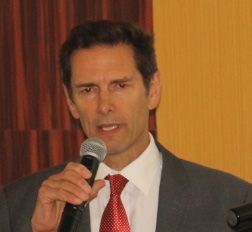Saying Guyana’s Second Draft Local Content Policy Framework caters well for its people, expert Michael Warner is urging citizens to act swiftly to equip themselves to be globally competitive in the oil and gas field.

“The policy is saying we are going to have a collaborative and pragmatic approach. My advice is to get going with that, get going fast with that. We need to get moving, we need to act,” Warner told members of the Georgetown Chamber of Commerce and Industry (GCCI) on Wednesday at the Pegasus Hotel.
“There is a lot of good material,” he added even as he urged that persons familiarize themselves with the document.
Facilitated by DAI International Group, the company managing ExxonMobil’s Centre for Local Business Development (CLBD), the British local content expert and Founder and Director of the Local Content Solutions Limited guided GCCI members through aspects of the draft and how they can make the most of it.

“Local Content under the Guyanese narrative will be understood as the sum of inputs of local goods and services including employment across the oil and gas value chain. The primary aim and objective of the policy is ensuring the education, inclusion, and advancement of as many as possible in the value chain of the oil and gas industry. In an effort to maximize benefits and retain value from Guyana’s petroleum resources, considerable focus will be given towards Capacity Development, Local Content and Value Addition,” Guyana’s Second Draft Local Content Policy states.
According to World Bank research on local content and oil and gas oil content portal oilandgasiq.com, the main local content objective of every country is to provide jobs and to keep its wealth within its borders.
As a result, a recent listing provided by Exxon of 227 local companies and individuals that it and its subcontractors had done business with in the first quarter of this year faced criticism over whether it meets the understanding of local content as the building of a skilled local workforce and a competitive manufacturing and supplier base, and oil and gas technology transfer.
Although the government said that Exxon’s spending on local service providers accounted for some $2.8 billion, the listings did not detail the services provided or indicate whether the transactions represented long term or one-off agreements and seemed to be focused primarily on service providers.
Critics noted that the premier skills development institutions, such as the University of Guyana and the Government Technical Institute, had not been included in the listing. This newspaper has been unable to verify if the institutions formed part of the company’s local content plans.

But he said that while the document focuses on creating jobs and procurement opportunities for locals, this country would have to also ensure that it is not in breach of World Trade Organization rules, to which it is a party.
“The implementation of the policy does not need an external advisor to say ‘here are the principles for implementation,’ they are written in the policy and they are all very sensible, well considered,” he said.
The Private Sector Commission continues to emphasize the need for a beneficial local content policy and the edification of its members of what such a policy must entail.
Its Chairman Eddie Boyer has said the policy must be beneficial to both the suppliers of goods and services and the recipient of goods and services.
“There must be trust and mentoring of business in this new industry. While we represent the private sector, we cannot work alone. We need to work hand in hand with government to ensure that opportunities for fair competition is made possible. The question on hand for both parties is how important is this industry to us all. If the answer is very important, then success would be gained by collaboration between business and government,” he had told a forum in March of this year.
“Entrepreneurs must understand that there is no substitute for what is required. We must develop the skill to understand what is required and adopt best practices. There will be competition from our neighbours, who are oil and gas producers and we are aware of this competition at our doorsteps. However, I am sure that given the expertise and knowledge available to us we will enjoy the fruits of the new world open to us. We need to learn about this industry as much as we can, in the little time that we have, to keep our engine of growth purring. As a caution though, we should not invest blindly because of promises of prosperity but exercise due diligence and assess the investment risks,” he added.

